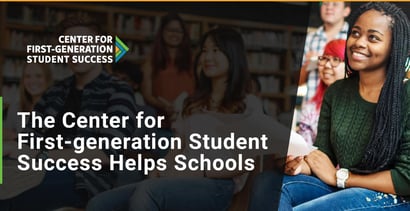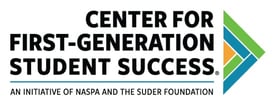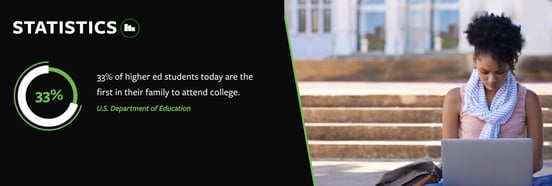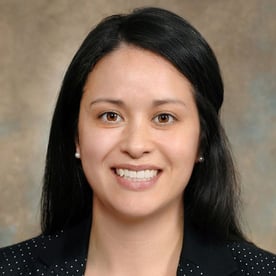
In a Nutshell: First-generation college students are not graduating from four-year colleges at the same rate or frequency as their peers. That’s because these students often face academic and social barriers that can hinder their success. And if those students accrue loans for additional years or don’t complete their degrees, that loan ROI may be diminished or decimated. The Center for First-generation Student Success produces research and advocates for legislation that enables colleges and universities to better support first-gen students and help them achieve their academic dreams.
First-generation college students face many hurdles when they enroll in college. A recent study from two researchers at the University of Minnesota titled “Breaking Down Barriers: Academic Obstacles of First-Generation Students at Research Universities” highlighted some of those challenges.
Some obstacles are academic. For example, students may lack the study skills that their non-first-generation peers have. First-generation students may also perceive their English or math skills as less developed, meaning that even if they were prepared in those areas, they could lack the confidence to follow through.
Unfortunately, most barriers are non-academic. Job and family responsibilities are more likely to affect first-gen students, and those students are more likely to be depressed than their peers, according to research.
As the number of first-generation college students grows, colleges also need to be well-equipped to prepare those students for graduation. That is where the Center for First-generation Student Success comes in. The nonprofit organization focuses on research and advocacy work that post-secondary institutions can use to prepare first-generation students.

“According to findings from a 2020 Center on Education and the Workforce report, sixty-five percent of all jobs require training or post-secondary education, which means a community or technical college program or beyond,” said Deana Waintraub Stafford, Director of the Center for First-generation Student Success. “To secure a lot of gainful employment opportunities, you need to be trained at technical or community colleges or four-year institutions.”
Impediments to success for first-generation students can also have long-term implications. For example, even though a third of currently enrolled college students are first-generation students, only 27% of those students will graduate within four years. A greater percentage will graduate in five or six years, though not all students who enroll will graduate from four-year, technical, or community colleges.
The longer a student takes to complete a degree, the more student loans they accrue. At the same time, students who take longer to complete their degrees are also less likely to finish.
Career Advancement Often Requires College Education
Students who don’t graduate at all still must pay off their student loan debt.
“They made an investment that had no return. They’re stuck with this debt, and getting out of that debt is difficult for them,” said Phillip Levine, Professor of Economics at Wellesley College.
Student loan ROI is crucial for first-generation students. They need to complete their degrees to make their time in college worthwhile and to find success in the job marketplace.
The Center has two repositories that house research, news, and blogs relevant to this topic. The organization also shares innovative programming devised by colleges and universities that other institutions can adopt. This information ensures institutions better serve first-gen students through access to the research and knowledge they need.

The Center also has two leadership boards, including one made up of education practitioners and leaders who help raise awareness of first-gen issues in legislatures.
“We receive feedback from our constituents based on the resources we disseminate. Our work has raised awareness because institutions of higher education are paying more attention,” Waintraub Stafford told us. “With the increased demand of post-secondary education and training, it is on all of us to dedicate these efforts and be intentional in our support offerings.”
The Center Helps Institutions with Retention Initiatives
One reason the difficulties of first-generation students may have been overlooked is that this student population was not tracked as well as it could be. Now, institutions and programs, including TRiO programs who have supported first-gen students for decades, are identifying and tracking first-gen students through the application process, FAFSA, and other self-reporting tools.
Still, that definition can be somewhat ambiguous. The federal definition states that neither parent completed a four-year degree. However, does that mean that if a student has siblings who attend college, is he or she no longer considered a first-generation college student? What if a parent completed one college course?

The Center provides a definition helpful in understanding this concept:
“Ultimately, the term ‘first-generation’ implies the possibility that a student may lack the critical cultural capital necessary for college success because their parents did not attend college. While first-generation students are often quite academically skilled and contribute in many ways to a campus community, navigating the tangled web of college policies, procedures, jargon, and expectations can be a challenge,” according to the website.
Many of the Center’s leaders were first-generation students themselves and wanted to give back.
“Someone supported you, and now you want to share with someone who shares your identity. The majority of our staff identify as first-gen,” Waintraub Stafford said.
The Center also offers guidance on how colleges and universities can help these students succeed. A few ideas include removing the requirement of standardized testing for college admissions.
“Even as we think of access, standardized testing serves as a barrier — the cost of the test and traveling to a test site. Many institutions have thought about equitable access and removed the requirement of standardized testing to create more equitable access to higher education,” said Waintraub Stafford.
Colleges can also remove jargon from the process, including ambiguous definitions that first-gen students, and their parents, may not understand.
Increased First-Gen Graduation Influences Communities
Waintraub Stafford and the Center encourage institutions to consider academic experience on a continuum, not just on a completion basis. That helps institutions fully envision the long-term impacts of completing a degree as a first-gen student. Those degrees will affect individual futures and communities.
And if more students complete their degrees, it can also help colleges and universities develop a more robust alumni network.
“Institutions also have a return on investment — they invest in students, and students invest back,” Waintraub Stafford told us.
If colleges and universities want to ensure first-gen students understand personal finance, one of the best methods is connecting them with the financial aid office.
“When framing financial literacy within the context of a college or university, we often focus on the tuition bill, but it is important to consider other opportunities for increased knowledge to include budgeting, opening a bank account, understanding the function of a credit card, and interest rates on loan. This helps first-gen students make educated decisions that benefit them across a lifetime,” Waintraub Stafford said.
The Center’s goal is to help first-gen students find success in college by showing institutions how to provide them with the right support. If colleges and universities want to be better advocates for first-generation students, they can review the Center’s reports about two-year and four-year college landscapes.
Waintraub Stafford and the team hope higher education professionals recognize how important it is for institutions to support the academic goals of first-gen students. She offers advice for practitioners seeking to develop supportive, holistic programming.
“Think about the identity of first-gen students at your institution. Our research validates the creation of programs and establishes grounds to support students, as you can pull in the data from the national perspective,” Waintraub Stafford said.




